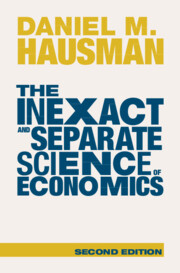Book contents
- The Inexact and Separate Science of Economics
- The Inexact and Separate Science of Economics
- Copyright page
- Contents
- Figures
- Tables
- Introduction
- Part I Introduction: Content, Structure, and Strategy of Mainstream Economics
- Part II Theory Assessment
- 9 Inexactness in Economic Theory
- 10 Mill’s Deductive Method and the Assessment of Economic Hypotheses
- 11 Methodological Revolution
- 12 Karl Popper and Imre Lakatos
- 13 The Inexact Deductive Method
- 14 Casting off Dogmatism
- Part III Conclusion
- Appendix An Introduction to Philosophy of Science
- References
- Index
10 - Mill’s Deductive Method and the Assessment of Economic Hypotheses
from Part II - Theory Assessment
Published online by Cambridge University Press: 25 May 2023
- The Inexact and Separate Science of Economics
- The Inexact and Separate Science of Economics
- Copyright page
- Contents
- Figures
- Tables
- Introduction
- Part I Introduction: Content, Structure, and Strategy of Mainstream Economics
- Part II Theory Assessment
- 9 Inexactness in Economic Theory
- 10 Mill’s Deductive Method and the Assessment of Economic Hypotheses
- 11 Methodological Revolution
- 12 Karl Popper and Imre Lakatos
- 13 The Inexact Deductive Method
- 14 Casting off Dogmatism
- Part III Conclusion
- Appendix An Introduction to Philosophy of Science
- References
- Index
Summary
Chapter 10 considers what conditions must be met if one is to have good reason to accept tendency claims or inexact laws, and it presents an interpretation of J. S. Mills views on confirmation, which still appear to dominate methodological practice in economics. It begins in §10.1 by discussing well-known Bayesian, hypothetico-deductive, and likelihood approaches to confirmation, before focusing on an indirect inductive method, which Mill calls “the method a priori” or “the deductive method.” §10.2 lays out the broad outlines of Mill’s deductive method. §10.3 expands upon Mill’s method a posteriori – his direct inductive method – to address the question of how economists can know whether their fundamental generalizations express inexact laws or tendencies. §10.4 examines in detail what Mill has to say about his deductive method, while §10.5 lays out the implicit algorithm that Mill offers for testing the implications of theoretical hypotheses in an inexact and separate science.
Keywords
- Type
- Chapter
- Information
- The Inexact and Separate Science of Economics , pp. 256 - 276Publisher: Cambridge University PressPrint publication year: 2023

